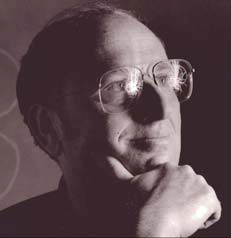Abraham Seiden, professor of physics at UC Santa Cruz, has led the Santa Cruz Institute for Particle Physics (SCIPP) since its founding in 1981. At the end of June, he will step down as director of SCIPP and return to full-time teaching and research.
"It's been 30 years and I thought this was a good time to step down," Seiden said. "We've broadened the scope of our research programs dramatically, and I'm very proud of the scientists and staff we have. It's been an honor to help facilitate these programs."
Steven Ritz, a professor of physics who has been associate director of SCIPP since joining the UCSC faculty last year, will replace Seiden as director.
Over the past 30 years, SCIPP researchers have participated in a wide range of major physics experiments. The institute is recognized as a leader in the development of custom electronics and sensors for state-of-the-art particle detection systems, and its theoretical physicists also contribute to the planning and interpretation of major particle physics experiments. In addition, SCIPP researchers have begun to apply their technical innovations in electronics and detectors to other scientific fields, such as neurobiology and biomedicine.
As an interdisciplinary research unit, SCIPP has benefited from the strong connections between researchers in physics, astronomy, and astrophysics at UCSC. New projects have helped foster additional connections between physicists and biologists on campus.
Originally established to take advantage of research opportunities at the Stanford Linear Accelerator Center (SLAC), SCIPP has been involved in efforts at premier high-energy physics facilities around the world. Current high-profile projects include the ATLAS detector at the Large Hadron Collider (LHC) in Geneva, Switzerland, and the Fermi Gamma-Ray Space Telescope. Ritz is the deputy principal investigator for Fermi's Large Area Telescope, designed by SCIPP researchers and others to detect and measure gamma rays from space.
According to Ritz, SCIPP has a reputation in the physics community for innovative science and a collaborative atmosphere. "It's known for having very smart people who are also fun to work with. People like to work together here--they take an interest in each other's research and don't waste time on petty disagreements," he said. "I give Abe Seiden a lot of credit for setting that tone. He and [assistant director] Georgia Hamel have really built this place into something fantastic."
Seiden said he looks forward to having more time to focus his attention on projects related to the LHC, the most powerful particle collider ever built. He is leading a proposal involving 11 institutions to develop a new type of detector for the LHC. He is also managing U.S. participation in the effort to develop a major upgrade of the ATLAS detector.
"I was on sabbatical this year, and it was still my busiest year ever," Seiden said. "These large projects involve so many people and institutions that the interactions with people take up a lot of time, but it's necessary to keep everybody involved and working together."
Seiden earned his Ph.D. in physics at UCSC and joined the UCSC faculty in 1976. He earned his B.S. in applied physics at Columbia University and M.S. in physics at Caltech. A fellow of the American Physical Society, Seiden has chaired and served on numerous national scientific advisory committees. He received the Outstanding Faculty Award from the Division of Natural Sciences in 1995.
Ritz, who came to UCSC from NASA's Goddard Space Flight Center, was involved in several high-energy physics experiments at particle colliders before joining the Fermi project in 1996. His contributions to scientific advisory panels include serving on the National Research Council's astronomy and astrophysics decadal survey committee, which will recommend priorities for the next decade of scientific activities in these areas.
"This is an exciting time in physics and astrophysics," Ritz said. "I can't guess what nature is going to tell us from the Fermi and LHC experiments, as well as from the other exciting projects at SCIPP, but a lot will be converging over the next few years. It's a time of great opportunity."



